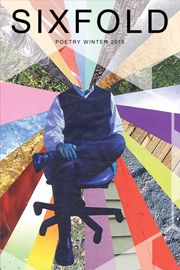
Poetry Winter 2015 fiction all issues

whitespacefiller
Cover Peter Rawlings
J. H Yun
Yesenia
& other poems
Colby Hansen
Killing Jar #37
& other poems
Melissa Bond
Freud's Asparagus
& other poems
Jane Schulman
When Krupa Played Those Drums
& other poems
Susan F. Glassmeyer
First Moon of a Blue Moon Month
& other poems
Melissa Tyndall
Haptics
& other poems
Micah Chatterton
Medicine
& other poems
Emily Graf
Toolbox
& other poems
Kate Magill
LV Winter, 2015
& other poems
Michael Fleming
Meeting Mrs. Ping
& other poems
Richard Parisio
Brown Creeper
& other poems
Jennifer Leigh Stevenson
Circe in Business
& other poems
Laurel Eshelman
Tuckpointing
& other poems
Barry W. North
Molotov Cocktail of the Deep South
& other poems
Charles C. Childers
Privilege
& other poems
Ricky Ray
A Way to Work
& other poems
Cassandra Sanborn
Revelation
& other poems
Linda Sonia Miller
Full Circle
& other poems
J. Lee Strickland
Anna's Plague
& other poems
Erin Dorso
In the Kitchen
& other poems
Holly Lyn Walrath
Behind the Glass
& other poems
Jeff Lewis
Charles Ives, A Connecticut Yankee
& other poems
Karen Kraco
Shaker Village at Pleasant Hill
& other poems
Rafael Miguel Montes
Casket
& other poems
Charles C. Childers
Camouflage
Under the shade of a barren
apple orchard, little children play
at poverty.
With no shoes, they smear dirt
on their noses and clothes.
All innocence in hillbilly blackface.
They make mock depression dolls
with their lunch left-overs, chuck rocks
at beehives, pummel a copperhead corpse
with fiberglass fence-posts and fish for leaves
in mud puddles with bits of string.
They were sensible enough
to bring these things
from the air-conditioned city.
By the time they return
to the farmhouse, they’re covered
in burs, like coonhound curs,
new clothes all tattered and torn.
Their aged grandma catches them,
and tans their backs with a switch.
The children, tear-choked,
scream incoherently
at the injustice of it all.
Privilege
It was a generation that crept
along on knee-pads.
These, the picayune people,
preyed upon
the Almighty Dollar,
panhandling in cashmere suits
and charmeuse silk dresses.
Recessive
My mother’s in the living room,
staining the walls, spraying
them with the sickly sweet yellow
smell of cigarillo smoke,
using calloused hands as an ashtray,
and my father’s out of work.
I can hear him in the bedroom
suppressing sobs,
like smothering puppies,
into a bed-wallowed pillow.
They barely speak between
their gasping, both fighting for air
in their claustrophobic closeness.
Underseam
Between the incessant barking of the mixed-
pomeranian pup and the cutting clink
of knives on plates, nothing was audible—
a silence intolerable.
Of course, not racist, they kept their traps
shut. But still, she was a stain on the white tablecloth,
which one hides on the underside
or else attacks vigorously with bleach.
Synchronized
It’s dusk, and fireflies dot
the horizon in every direction,
communicating with their own kind
of Morse code. Brief dashes and dots
lighting up the trees, signals intermingling
with the indecipherable effects
of this midsummer evening.
As I fiddle with my notebook, trying
to capture the intricacies
of their language, I realize
its a frequency which has been denied me,
the antenna of my linguistic ear
broken to the complex cries
of their community.
One of theirs lands on my hand
in an act of sheer defiance,
as if to further my frustration
flaunt its semantic prowess,
and began to brandish
a rather aureate display
in order to irritate me.
. . . - - - . . .
I smashed it and felt satisfied,
demonstrating my own form
of intellectual supremacy.
Charles C. Childers is a writer based out of Huntington, WV. Graduating from Marshall University with degree in English (emphasis in literary studies), he aspires to someday get a graduate degree in comparative literature. Interests include: Zen and Taoism, bouts of social drinking, hiking the hillsides of his home state, raising fancy rats, general hell-raising and environmental advocacy.
is a writer based out of Huntington, WV. Graduating from Marshall University with degree in English (emphasis in literary studies), he aspires to someday get a graduate degree in comparative literature. Interests include: Zen and Taoism, bouts of social drinking, hiking the hillsides of his home state, raising fancy rats, general hell-raising and environmental advocacy.